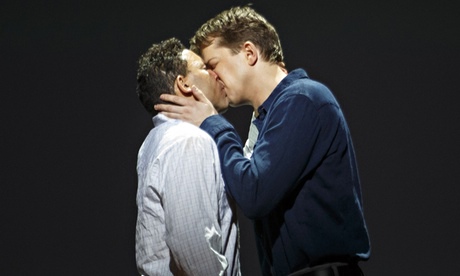 Charles Wuorinen’s compositional
style is not operatic; and he seems to shy away from emotion. I am not sure why
he bothered to write an opera. At the moment I cannot think of a less operatic
composer. And I don’t mean that everything has to be neo-romantic and diatonic
and pretty. Wuorinen’s style is 12-tone and (usually) serial—not styles that
lend themselves to lyricism. On the other hand, Alban Berg managed to write
very lyrical (still dissonant, but still lyrical) music using 12-tone
serialism, and so have other composers.
Charles Wuorinen’s compositional
style is not operatic; and he seems to shy away from emotion. I am not sure why
he bothered to write an opera. At the moment I cannot think of a less operatic
composer. And I don’t mean that everything has to be neo-romantic and diatonic
and pretty. Wuorinen’s style is 12-tone and (usually) serial—not styles that
lend themselves to lyricism. On the other hand, Alban Berg managed to write
very lyrical (still dissonant, but still lyrical) music using 12-tone
serialism, and so have other composers.Wuorinien and Proulx added some extra scenes to flesh out the women’s characters, apparently feeling that too much male voice singing would wear on the listener. In reality, however, it’s the music itself that’s wearing. Britten and Janacek made all-male textures work beautifully and dramatically.
Wuorinen says he wanted to take the
edge off the romanticism that the film layered on the story and get closer to
the original story—and admittedly, the original short story is pretty
stoic/unemotional/pragmatic/anti-optimistic. It’s a sad (but still slightly
romantic) story. Many writers have pointed out that it’s also a very traditional
operatic plot. Two people fall in love, but society/family/the nation/the gods
frown on their relationship, dooming the lovers to a tragic ending. But there’s not much romanticism here, even
when you think it might be nice to be a little
bit romantic. The unrelenting (dare I say it?) noise from the orchestra is exhausting; and it works against the drama.
So, Wuorinen did succeed in a way. He de-romanticized the plot. In fact he de-romanticized
the opera to the point that I wonder why they’re bothering to sing at all. As I
listened and watched, I kept feeling (hoping) that at any moment the characters
were going to really open up and SING. There are so many places it would work,
most especially for Ennis’s final monolog—almost
an aria—that closes the opera. (Only a late blackout cue tarnished the ending—I
think I’d have gone with a slow fade or a slowly descending curtain. But the
blackout would have worked if it happened on cue as Ennis’s last note ended)
The last vocal utterance is probably
the most effective moment of the entire piece. The orchestra finally shuts up
and the last note of the opera (sung by Ennis) is a cappella, high, and soft—contrasting
sweetly with the opening of the opera: a low and foreboding orchestral prelude. That quiet at the end is such a
relief, since the orchestra has been groaning, squawking, squeaking, blatting,
and blasting for the last 2 hours—often for no apparent dramatic reason. The orchestral
music doesn’t seem to have anything to do in particular with what is going on,
but—for better or for worse—it always keeps the tension flowing.
However effective, that closing scene is also probably the biggest missed opportunities in the opera. Much is made—in the short story, in the movie,
and in discussions of the opera—about Ennis’ inarticulateness. At the beginning,
he barely utters a word—in the opera it’s expressed by grunting, shouting, talking,
and Sprechstimme. As Ennis falls in
love and opens up, he sings more (although the composer has given him little
that sounds worth singing.) This final scene could/should have been a baritone tour de force.
Brokeback Mountain can be viewed on medici.tv for about 2.5 months.
Related Posts

No comments:
Post a Comment
Comments are very welcome! They won't be moderated; but rude, abusive, and/or radically off-topic posts will be removed.